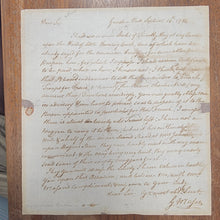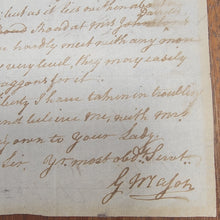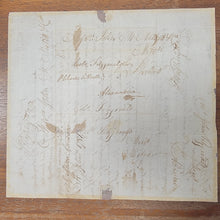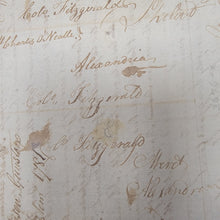George Mason autograph letter signed complaining that his hay was "seized for the American Army"
George Mason RARE American Revolution war dated Autograph Letter Signed "G. Mason." One page, 7.5" x 8.25", Gunston Hall [Virginia], September 18, 1781. The letter is addressed on the verso to Colonel John Fitzgerald of Alexandria. Other names are also written on the verso, including "G:Washington [twice]" and "John M. Nesbitt & Co. [twice]." In the letter, Mason complains that two stacks of hay were "seized for the American Army or for some other public purpose" for which he hopes to be paid. He had several stacks remaining which he planned to sell to "the French Troops for Specie." It reads in part:
"I had six or seven Stacks of Timothy Hay at my Quarter upon the Head of little Hunting Creek, two of which have been already seized for the American Army or for some other public purpose here; for which I suppose I shall receive Certificates to be paid, when or how, I know not. I think it but reasonable that I should endeavour to sell the remainder to the French Troops for Specie, & having given the Bearer, Charles Neall (my overseer there) Directions accordingly, you will greatly oblige me in advising Him how to proceed, so as to dispose of it to the person appointed to purchase for the French. I imagine there is about twenty odd Tonns left; I have not a waggon to carry it to them; but as it lies within about a mile & ahalf of the main Road at Mrs. John Darrells house upon Dogues Run, they can hardly meet with any more convenient; & the way being very level, they may easily send some of their empty waggons for it."
Only ten miles from Washington's Mount Vernon, Gunston Hall, George Mason's Georgian-style mansion, sat at the center of his large plantation in Fairfax County, Virginia. Because the plantation specialized in tobacco, Mason owned many slaves, though he felt the institution was morally corrupt. During and after the American Revolution, Mason was selected as a delegate to two conventions (the Virginia Convention and the Constitutional Convention), but he eschewed public office. At the Virginia Convention, he authored the Virginia Declaration of Rights. Later at the Constitutional Convention in 1787, Mason sought to attenuate the power given to the federal government with more individual liberties. When this didn't happen, Mason, along with only two others, refused to support the new constitution. James Madison, however, introduced ten amendments (known as the Bill of Rights and fashioned on Mason's Virginia Declaration of Rights), which fully appeased Mason.
Professionally restored to remove all traces of cello tape at margins. Paper loss caused by removal of wax seal has been reinforced with Japanese tissue; small bit of paper loss occurring in sixth line of text affecting a single word has also been reinforced with tissue. Previous collector's notes in pencil appear at top and bottom margin. Letter remains highly legible and aesthetically pleasing.
Provenance: Heritage Auctions, September 2011 to a private Northern Virginia collector
George Mason autograph letter signed complaining that his hay was "seized for the American Army"
George Mason RARE American Revolution war dated Autograph Letter Signed "G. Mason." One page, 7.5" x 8.25", Gunston Hall [Virginia], September 18, 1781. The letter is addressed on the verso to Colonel John Fitzgerald of Alexandria. Other names are also written on the verso, including "G:Washington [twice]" and "John M. Nesbitt & Co. [twice]." In the letter, Mason complains that two stacks of hay were "seized for the American Army or for some other public purpose" for which he hopes to be paid. He had several stacks remaining which he planned to sell to "the French Troops for Specie." It reads in part:
"I had six or seven Stacks of Timothy Hay at my Quarter upon the Head of little Hunting Creek, two of which have been already seized for the American Army or for some other public purpose here; for which I suppose I shall receive Certificates to be paid, when or how, I know not. I think it but reasonable that I should endeavour to sell the remainder to the French Troops for Specie, & having given the Bearer, Charles Neall (my overseer there) Directions accordingly, you will greatly oblige me in advising Him how to proceed, so as to dispose of it to the person appointed to purchase for the French. I imagine there is about twenty odd Tonns left; I have not a waggon to carry it to them; but as it lies within about a mile & ahalf of the main Road at Mrs. John Darrells house upon Dogues Run, they can hardly meet with any more convenient; & the way being very level, they may easily send some of their empty waggons for it."
Only ten miles from Washington's Mount Vernon, Gunston Hall, George Mason's Georgian-style mansion, sat at the center of his large plantation in Fairfax County, Virginia. Because the plantation specialized in tobacco, Mason owned many slaves, though he felt the institution was morally corrupt. During and after the American Revolution, Mason was selected as a delegate to two conventions (the Virginia Convention and the Constitutional Convention), but he eschewed public office. At the Virginia Convention, he authored the Virginia Declaration of Rights. Later at the Constitutional Convention in 1787, Mason sought to attenuate the power given to the federal government with more individual liberties. When this didn't happen, Mason, along with only two others, refused to support the new constitution. James Madison, however, introduced ten amendments (known as the Bill of Rights and fashioned on Mason's Virginia Declaration of Rights), which fully appeased Mason.
Professionally restored to remove all traces of cello tape at margins. Paper loss caused by removal of wax seal has been reinforced with Japanese tissue; small bit of paper loss occurring in sixth line of text affecting a single word has also been reinforced with tissue. Previous collector's notes in pencil appear at top and bottom margin. Letter remains highly legible and aesthetically pleasing.
Provenance: Heritage Auctions, September 2011 to a private Northern Virginia collector
George Mason autograph letter signed complaining that his hay was "seized for the American Army"
George Mason RARE American Revolution war dated Autograph Letter Signed "G. Mason." One page, 7.5" x 8.25", Gunston Hall [Virginia], September 18, 1781. The letter is addressed on the verso to Colonel John Fitzgerald of Alexandria. Other names are also written on the verso, including "G:Washington [twice]" and "John M. Nesbitt & Co. [twice]." In the letter, Mason complains that two stacks of hay were "seized for the American Army or for some other public purpose" for which he hopes to be paid. He had several stacks remaining which he planned to sell to "the French Troops for Specie." It reads in part:
"I had six or seven Stacks of Timothy Hay at my Quarter upon the Head of little Hunting Creek, two of which have been already seized for the American Army or for some other public purpose here; for which I suppose I shall receive Certificates to be paid, when or how, I know not. I think it but reasonable that I should endeavour to sell the remainder to the French Troops for Specie, & having given the Bearer, Charles Neall (my overseer there) Directions accordingly, you will greatly oblige me in advising Him how to proceed, so as to dispose of it to the person appointed to purchase for the French. I imagine there is about twenty odd Tonns left; I have not a waggon to carry it to them; but as it lies within about a mile & ahalf of the main Road at Mrs. John Darrells house upon Dogues Run, they can hardly meet with any more convenient; & the way being very level, they may easily send some of their empty waggons for it."
Only ten miles from Washington's Mount Vernon, Gunston Hall, George Mason's Georgian-style mansion, sat at the center of his large plantation in Fairfax County, Virginia. Because the plantation specialized in tobacco, Mason owned many slaves, though he felt the institution was morally corrupt. During and after the American Revolution, Mason was selected as a delegate to two conventions (the Virginia Convention and the Constitutional Convention), but he eschewed public office. At the Virginia Convention, he authored the Virginia Declaration of Rights. Later at the Constitutional Convention in 1787, Mason sought to attenuate the power given to the federal government with more individual liberties. When this didn't happen, Mason, along with only two others, refused to support the new constitution. James Madison, however, introduced ten amendments (known as the Bill of Rights and fashioned on Mason's Virginia Declaration of Rights), which fully appeased Mason.
Professionally restored to remove all traces of cello tape at margins. Paper loss caused by removal of wax seal has been reinforced with Japanese tissue; small bit of paper loss occurring in sixth line of text affecting a single word has also been reinforced with tissue. Previous collector's notes in pencil appear at top and bottom margin. Letter remains highly legible and aesthetically pleasing.
Provenance: Heritage Auctions, September 2011 to a private Northern Virginia collector
George Mason autograph letter signed complaining that his hay was "seized for the American Army"
George Mason RARE American Revolution war dated Autograph Letter Signed "G. Mason." One page, 7.5" x 8.25", Gunston Hall [Virginia], September 18, 1781. The letter is addressed on the verso to Colonel John Fitzgerald of Alexandria. Other names are also written on the verso, including "G:Washington [twice]" and "John M. Nesbitt & Co. [twice]." In the letter, Mason complains that two stacks of hay were "seized for the American Army or for some other public purpose" for which he hopes to be paid. He had several stacks remaining which he planned to sell to "the French Troops for Specie." It reads in part:
"I had six or seven Stacks of Timothy Hay at my Quarter upon the Head of little Hunting Creek, two of which have been already seized for the American Army or for some other public purpose here; for which I suppose I shall receive Certificates to be paid, when or how, I know not. I think it but reasonable that I should endeavour to sell the remainder to the French Troops for Specie, & having given the Bearer, Charles Neall (my overseer there) Directions accordingly, you will greatly oblige me in advising Him how to proceed, so as to dispose of it to the person appointed to purchase for the French. I imagine there is about twenty odd Tonns left; I have not a waggon to carry it to them; but as it lies within about a mile & ahalf of the main Road at Mrs. John Darrells house upon Dogues Run, they can hardly meet with any more convenient; & the way being very level, they may easily send some of their empty waggons for it."
Only ten miles from Washington's Mount Vernon, Gunston Hall, George Mason's Georgian-style mansion, sat at the center of his large plantation in Fairfax County, Virginia. Because the plantation specialized in tobacco, Mason owned many slaves, though he felt the institution was morally corrupt. During and after the American Revolution, Mason was selected as a delegate to two conventions (the Virginia Convention and the Constitutional Convention), but he eschewed public office. At the Virginia Convention, he authored the Virginia Declaration of Rights. Later at the Constitutional Convention in 1787, Mason sought to attenuate the power given to the federal government with more individual liberties. When this didn't happen, Mason, along with only two others, refused to support the new constitution. James Madison, however, introduced ten amendments (known as the Bill of Rights and fashioned on Mason's Virginia Declaration of Rights), which fully appeased Mason.
Professionally restored to remove all traces of cello tape at margins. Paper loss caused by removal of wax seal has been reinforced with Japanese tissue; small bit of paper loss occurring in sixth line of text affecting a single word has also been reinforced with tissue. Previous collector's notes in pencil appear at top and bottom margin. Letter remains highly legible and aesthetically pleasing.
Provenance: Heritage Auctions, September 2011 to a private Northern Virginia collector








